Author Photo And Bio
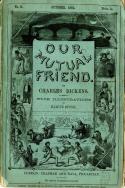 1. Our Mutual Friend by Charles Dickens (1864–65). A miserly father dies and leaves his fortune to his estranged son —so long as he marries a woman he’s never met. While returning home, John Harmon appears to be murdered. He survives and goes undercover. As John Rokesmith, he becomes secretary to the man next in line for his father’s estate, Mr. Boffin. Clever coincidences and revelations follow in this novel notable for its wickedly funny treatment of middle-class society.
1. Our Mutual Friend by Charles Dickens (1864–65). A miserly father dies and leaves his fortune to his estranged son —so long as he marries a woman he’s never met. While returning home, John Harmon appears to be murdered. He survives and goes undercover. As John Rokesmith, he becomes secretary to the man next in line for his father’s estate, Mr. Boffin. Clever coincidences and revelations follow in this novel notable for its wickedly funny treatment of middle-class society.
 2. Emma by Jane Austen (1816). The story of Miss Woodhouse —busybody, know-it-all, and general relationship enthusiast —is a comedy of manners deftly laced with social criticism. The charm largely inheres in Emma’s imperfections: her slightly spoiled maneuverings, her highly fallible matchmaking, her inability to know her own heart. Emma teeters from lovable one moment to tiresome and self-centered the next. In writing her story, Austen found an ideal venue for her note-perfect, never-equaled archness.
2. Emma by Jane Austen (1816). The story of Miss Woodhouse —busybody, know-it-all, and general relationship enthusiast —is a comedy of manners deftly laced with social criticism. The charm largely inheres in Emma’s imperfections: her slightly spoiled maneuverings, her highly fallible matchmaking, her inability to know her own heart. Emma teeters from lovable one moment to tiresome and self-centered the next. In writing her story, Austen found an ideal venue for her note-perfect, never-equaled archness.
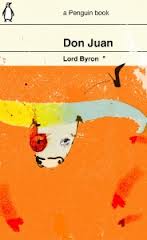 3. Don Juan by Lord Byron (1819). Byron was a gentleman, a womanizer, a cad, and a liberator. He poured a lifetime of observations into this seventeen canto poem. Ostensibly about a Spanish boy sent abroad by his mother after an unfortunate love affair, it has the spontaneous gaiety of a man who is courteously maintaining the fiction that the reader’s experience of women, politics, poetry, and the world is as extensive as his own. Thus Byron transformed his greatest masterpiece —his life —into art.
3. Don Juan by Lord Byron (1819). Byron was a gentleman, a womanizer, a cad, and a liberator. He poured a lifetime of observations into this seventeen canto poem. Ostensibly about a Spanish boy sent abroad by his mother after an unfortunate love affair, it has the spontaneous gaiety of a man who is courteously maintaining the fiction that the reader’s experience of women, politics, poetry, and the world is as extensive as his own. Thus Byron transformed his greatest masterpiece —his life —into art.
 4. The Portrait of a Lady by Henry James (1881). James’s Portrait is of that superior creature Isabel Archer, an assured American girl who is determined to forge her destiny in the drawing rooms of Europe. To this end, she weds the older and more cultivated Gilbert Osmond, and eventually finds that she is less the author of her fate than she thought. Throughout, James gives us a combination of careful psychological refraction and truly diabolical plotting. The result is a book at once chilling and glorious.
4. The Portrait of a Lady by Henry James (1881). James’s Portrait is of that superior creature Isabel Archer, an assured American girl who is determined to forge her destiny in the drawing rooms of Europe. To this end, she weds the older and more cultivated Gilbert Osmond, and eventually finds that she is less the author of her fate than she thought. Throughout, James gives us a combination of careful psychological refraction and truly diabolical plotting. The result is a book at once chilling and glorious.
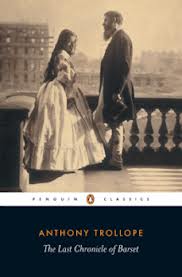 5. The Last Chronicle of Barset by Anthony Trollope (1867). Trollope’s inimitable gift for combining the chatty and the epic found its greatest flowering in this, the sixth and final volume of his Barsetshire series. From a simple premise —a proud but poor clergyman, Josiah Crawley, is accused of stealing twenty pounds —Trollope creates a web of vivid characters and intrigues while completing a monumental set of works about mid-nineteenth-century England that rival the classics of George Eliot and Charles Dickens.
5. The Last Chronicle of Barset by Anthony Trollope (1867). Trollope’s inimitable gift for combining the chatty and the epic found its greatest flowering in this, the sixth and final volume of his Barsetshire series. From a simple premise —a proud but poor clergyman, Josiah Crawley, is accused of stealing twenty pounds —Trollope creates a web of vivid characters and intrigues while completing a monumental set of works about mid-nineteenth-century England that rival the classics of George Eliot and Charles Dickens.
 6. Middlemarch by George Eliot (1871–72). Dorothea Brooke is a pretty young idealist whose desire to improve the world leads her to marry the crusty pedant Casaubon. This mistake takes her down a circuitous and painful path in search of happiness. The novel, which explores society’s brakes on women and deteriorating rural life, is as much a chronicle of the English town of Middlemarch as it is the portrait of a lady. Eliot excels at parsing moments of moral crisis so that we feel a character’s anguish and resolve. Her intelligent sympathy for even the most unlikable people redirects our own moral compass toward charity rather than enmity.
6. Middlemarch by George Eliot (1871–72). Dorothea Brooke is a pretty young idealist whose desire to improve the world leads her to marry the crusty pedant Casaubon. This mistake takes her down a circuitous and painful path in search of happiness. The novel, which explores society’s brakes on women and deteriorating rural life, is as much a chronicle of the English town of Middlemarch as it is the portrait of a lady. Eliot excels at parsing moments of moral crisis so that we feel a character’s anguish and resolve. Her intelligent sympathy for even the most unlikable people redirects our own moral compass toward charity rather than enmity.
 7. Tristram Shandy by Laurence Sterne (1759–67). Sterne promises the “life and opinions” of his protagonist. Yet halfway through the fourth volume of nine, we are still in the first day of the hero’s life thanks to marvelous digressions and what the narrator calls “unforeseen stoppages”—detailing the quirky habits of his eccentric family members and their friends. This broken narrative is unified by Sterne’s comic touch, which shimmers in this thoroughly entertaining novel that harks back to Don Quixote and foreshadows Ulysses.
7. Tristram Shandy by Laurence Sterne (1759–67). Sterne promises the “life and opinions” of his protagonist. Yet halfway through the fourth volume of nine, we are still in the first day of the hero’s life thanks to marvelous digressions and what the narrator calls “unforeseen stoppages”—detailing the quirky habits of his eccentric family members and their friends. This broken narrative is unified by Sterne’s comic touch, which shimmers in this thoroughly entertaining novel that harks back to Don Quixote and foreshadows Ulysses.
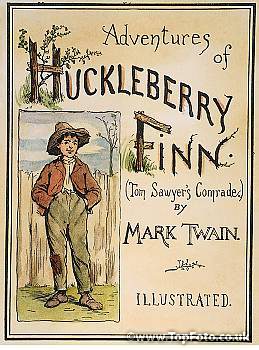 8. Adventures of Huckleberry Finn by Mark Twain (1884). Hemingway proclaimed, “All modern American literature comes from . . . ‘Huckleberry Finn.’ ” But one can read it simply as a straightforward adventure story in which two comrades of conve nience, the parentally abused rascal Huck and fugitive slave Jim, escape the laws and conventions of society on a raft trip down the Mississippi. Alternatively, it’s a subversive satire in which Twain uses the only superficially naïve Huck to comment bitingly on the evils of racial bigotry, religious hypocrisy, and capitalist greed he observes in a host of other largely unsympathetic characters. Huck’s climactic decision to “light out for the Territory ahead of the rest” rather than submit to the starched standards of “civilization” reflects a uniquely American strain of individualism and nonconformity stretching from Daniel Boone to Easy Rider.
8. Adventures of Huckleberry Finn by Mark Twain (1884). Hemingway proclaimed, “All modern American literature comes from . . . ‘Huckleberry Finn.’ ” But one can read it simply as a straightforward adventure story in which two comrades of conve nience, the parentally abused rascal Huck and fugitive slave Jim, escape the laws and conventions of society on a raft trip down the Mississippi. Alternatively, it’s a subversive satire in which Twain uses the only superficially naïve Huck to comment bitingly on the evils of racial bigotry, religious hypocrisy, and capitalist greed he observes in a host of other largely unsympathetic characters. Huck’s climactic decision to “light out for the Territory ahead of the rest” rather than submit to the starched standards of “civilization” reflects a uniquely American strain of individualism and nonconformity stretching from Daniel Boone to Easy Rider.
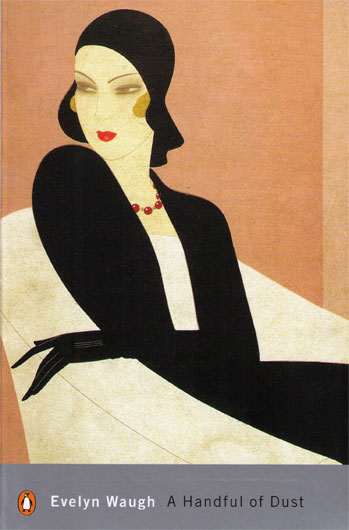 9. A Handful of Dust by Evelyn Waugh (1934). Leading lives of empty desperation, Waugh’s characters kill the days of their lives with petty concerns, silly parties, and unfulfilling affairs. A withering satire of England’s declining aristocracy, the novel showcases Waugh’s caustic eye and comic wit.
9. A Handful of Dust by Evelyn Waugh (1934). Leading lives of empty desperation, Waugh’s characters kill the days of their lives with petty concerns, silly parties, and unfulfilling affairs. A withering satire of England’s declining aristocracy, the novel showcases Waugh’s caustic eye and comic wit.
 10. Summer Lightning by P. G. Wodehouse (1929). In more than ninety comic novels graced with odd names and perfectly weighted sentences, Wodehouse imagined a daft world of British privilege. He wrote many different series of books built around specific characters, including Mr. Mulliner, Psmith, Ukridge, and his most famous creations, Bertie Wooster and Jeeves. One of the Blandings Castle novels, Summer Lightning is an intricate farce that displays Wodehouse’s penchant for anchoring his humor in ridiculous yet common circumstance —here it is a local competition to find the best pig —while exploring his great themes: social decorum and love.
10. Summer Lightning by P. G. Wodehouse (1929). In more than ninety comic novels graced with odd names and perfectly weighted sentences, Wodehouse imagined a daft world of British privilege. He wrote many different series of books built around specific characters, including Mr. Mulliner, Psmith, Ukridge, and his most famous creations, Bertie Wooster and Jeeves. One of the Blandings Castle novels, Summer Lightning is an intricate farce that displays Wodehouse’s penchant for anchoring his humor in ridiculous yet common circumstance —here it is a local competition to find the best pig —while exploring his great themes: social decorum and love.